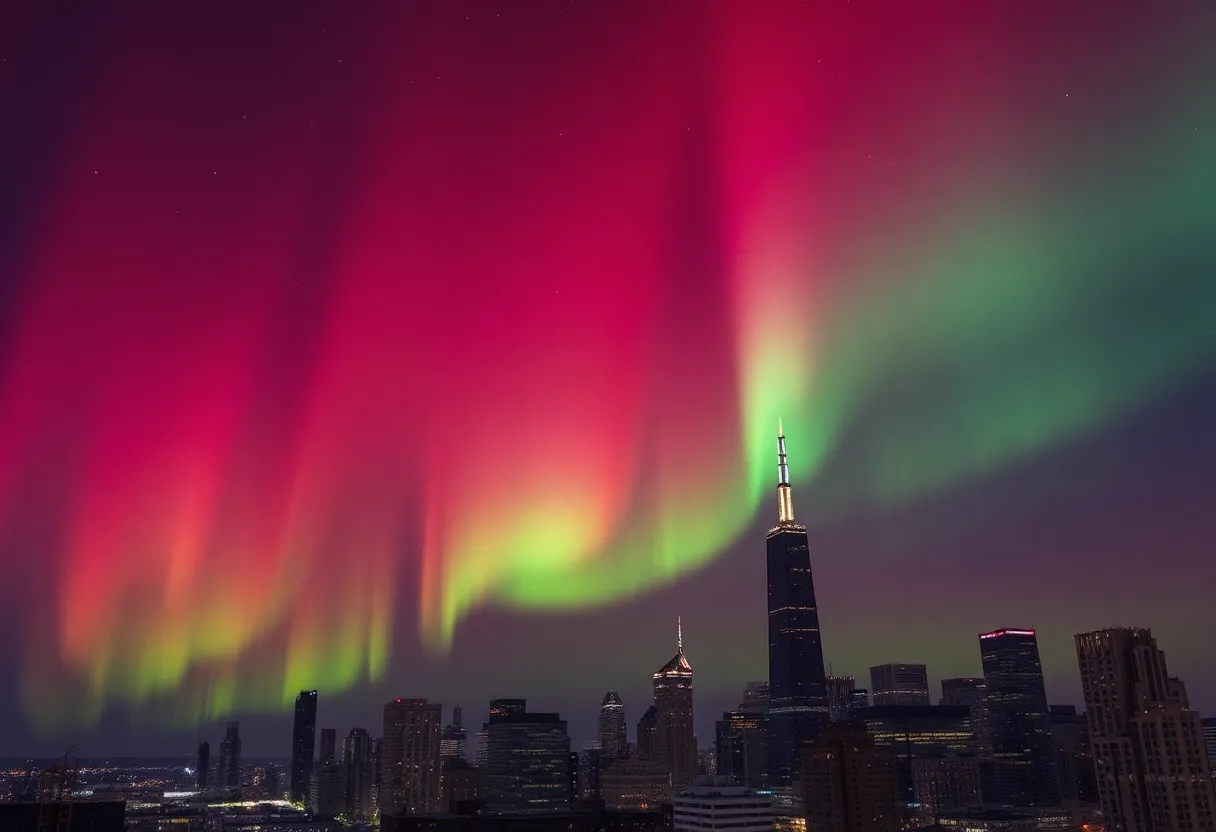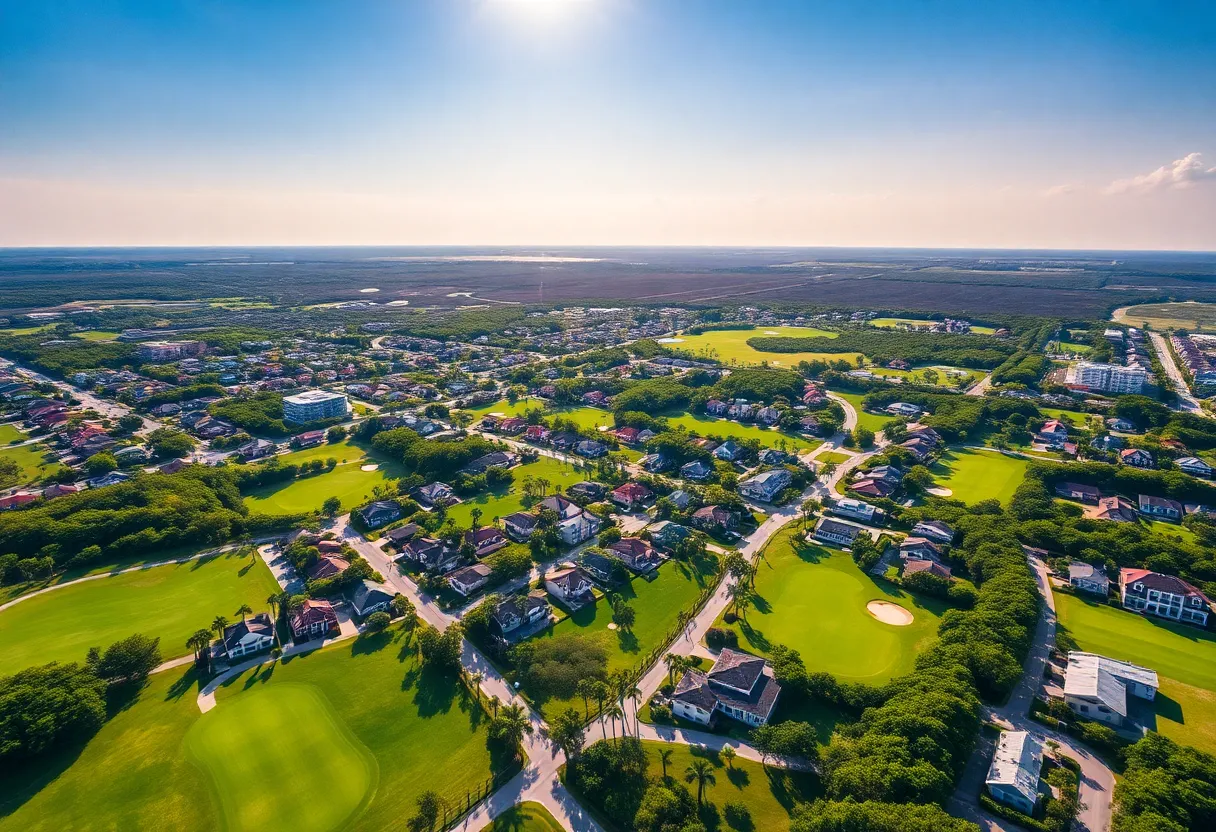News Summary
A G4 geomagnetic storm has provided an extraordinary opportunity for Chicagoans to witness the Northern Lights after sunset. Sparked by a coronal mass ejection from the sun, residents are advised to seek clear areas away from city lights. Despite some potential obstructions from wildfire smoke, the chance to see stunning displays of red, pink, and green hues is promising. Experts suggest potential viewing may continue into the following morning, so mark your calendars and embrace this rare celestial event that arises from an 11-year solar cycle reaching its peak.
Severe G4 Geomagnetic Storm Lights Up Skies for Chicago Residents
Hold onto your hats, folks! A powerful geomagnetic storm kicked into high gear early Sunday morning, bringing with it the thrilling chance to catch a glimpse of the Northern Lights over **Chicago**. This isn’t your average storm; it’s a serious G4 classification, which means we’re in for a **“severe geomagnetic storm,”** and that opens the door for some spectacular sky shows.
What’s Behind the Storm?
So, what’s causing all this excitement? A captivating event known as a coronal mass ejection hit Earth’s magnetosphere early Sunday. You could think of this as a giant bubble of charged particles from the sun that has raced toward us. When these particles, known as ions, meet the Earth’s atmospheric shield, you can expect some dazzling displays overhead. The fantastic part is that such storms sometimes allow the Northern Lights to shine as far south as **Texas, Alabama, and Mississippi**. No need to plan a trip to the Arctic this time!
Will Chicago Be Able to See the Lights?
If you’re in **Chicago**, you’ll want to be on the lookout after sunset on Sunday. Forecasts are predicting clear skies, which is a huge plus for anyone eager to see those magical colors dance across the sky. The Northern Lights typically show off in stunning hues of red, pink, and green as charged particles collide with different gases in the atmosphere. The height of these collisions affects which colors you might see!
However, not all areas will have that front-row view; some regions may face obstructed views due to wildfire smoke drifting down from southern Canada. Though a little haze is a bummer, it doesn’t mean you should give up hope just yet! If you’re in a clear area, stay patient. The intensity of the storm can be pretty unpredictable, and nature doesn’t always stick to a schedule.
Keep Your Eyes on the Sky
If you’re planning a lookout mission, experts suggest heading north and escaping the glare of city lights. Your best bets for spotting the aurora will be far away from urban light pollution. You might find that the experience is rewarding—even if it’s not a guaranteed result. Storm intensity can ebb and flow, meaning that the show might be at its best during unexpected moments. Sit tight and enjoy the anticipation!
What Else Should You Know?
This type of storm doesn’t just delight stargazers; it can also cause a bit of a ruckus back home. Geomagnetic storms can affect power grids, communication networks, and GPS systems. But no need to panic! Most companies and service providers have precautions in place to keep things running smoothly.
As excitement builds, keep in mind the storm’s effects could continue into Monday morning. However, the chances of viewing the Northern Lights will likely decline as the storm passes. So, mark Sunday night on your calendar and prepare for what could be a once-in-a-lifetime sky show!
The Bigger Picture
Interestingly, this geomagnetic storm is part of an 11-year solar cycle, which has recently tipped into a solar maximum. This means we might see more of these vivid displays in the near future, so keep those eyes peeled! In the world of space weather, we’re riding the wave of activity.
The Northern Lights have always captivated those lucky enough to see them, and now is your chance to catch a glimpse! Embrace the adventure, gather some friends, and enjoy the great outdoors as you look up at the night sky. Who knows what wonders await?
Deeper Dive: News & Info About This Topic
- NBC Chicago
- Wikipedia: Northern Lights
- Chicago Sun-Times
- Google Search: geomagnetic storm
- WGN TV
- Encyclopedia Britannica: geomagnetic storm
- CBS News
- Google News: northern lights

Author: STAFF HERE ORLANDO WRITER
ORLANDO STAFF WRITER The ORLANDO STAFF WRITER represents the experienced team at HEREOrlando.com, your go-to source for actionable local news and information in Orlando, Orange County, and beyond. Specializing in "news you can use," we cover essential topics like product reviews for personal and business needs, local business directories, politics, real estate trends, neighborhood insights, and state news affecting the area—with deep expertise drawn from years of dedicated reporting and strong community input, including local press releases and business updates. We deliver top reporting on high-value events such as Orlando International Fringe Theatre Festival, Megacon Orlando, and Central Florida Fair. Our coverage extends to key organizations like the Orlando Economic Partnership and Hispanic Chamber of Commerce Metro Orlando, plus leading businesses in leisure and hospitality that power the local economy such as Walt Disney World Resort, AdventHealth, and Universal Orlando. As part of the broader HERE network, including HEREJacksonville.com, HEREPetersburg.com, HERETallahassee.com, and HERETampa.com, we provide comprehensive, credible insights into Florida's dynamic landscape.




